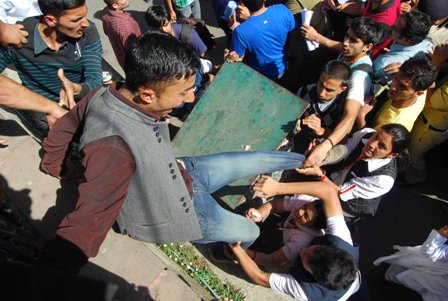New Delhi, May 17 (IANS) As Chinese Premier Li Keqiang arrives in India days after the two countries resolved a 20-day border stand-off, experts said India-China ties go back a long way and one should not judge the relations on the basis of one event.
Li arrives May 19 on a three-day state visit. He has chosen India as the first stop in his maiden foreign visit since taking over in March.
The border stand-off, which suddenly began April 15 after Chinese troops intruded 19 km inside the Line of Actual Control (LAC) in the Ladakh’s Depsang area and set up camps there, ended on May 5, following several rounds of military and diplomatic negotiations.
Noting that India-China relations go back a long time, former diplomat T.C.A. Rangachari said: “One should not jump to conclusions on the basis of one statement, one development or one event. There is a lot more to India-China relations.”
“One should look at the relations in the long term. There is a history to our relations, even the border issue goes back a long time,” Rangachari, Director, MMAJ Academy of International Studies, Jamia Millia Islamia, told IANS.
“The visit of the Chinese premier is a positive development and signifies the importance China’s new leadership places on relations with India,” the former envoy and China expert added.
According to foreign policy expert Sreeram Chaulia, Executive Director of the Centre for Global Governance and Policy (CGGP) at the Jindal School of International Affairs, O.P. Jindal Global University, Sonipat, the visit is important as Li chose India to be his first country for his foreign tour. This factor “has not gone unrecognized and there is a feeling that the gesture will go a long way in building trust,” Chaulia told IANS.
“In high level diplomacy, first state visits and meetings are crucial as they leave a lasting impression and set the path for the future of bilateral relationships,” he added.
According to Sreemati Chakrabarti, honorary fellow at the Institute of Chinese Studies (ICS), Li’s visit had been planned much before the stand-off. “Cancelling or postponing it from either side would have further strained relations, which is not desirable. Going ahead with the visit indicates that mechanisms to resolve such issues, which may come up again unless the borders get demarcated, are working,” Chakrabarti told IANS.
According to ICS director Alka Acharya, “there has been a political understanding in place between the two for the past decade and this visit re-emphasis the continued political policies of the new regime. She cited the example of the recently resolved border conflict as a sign of the great maturity exhibited by the two countries.
Acharya said both countries need to build on the existing understanding between them. “We have to build on the existing understanding so as to ensure a continued, peaceful negotiations for future standoffs.”
Referring to the border defence cooperation agreement mooted by China to resolve the boundary issue, Chakrabarti said: “When the Chinese have shown some urgency (to resolve the festering issue), it should be welcomed.”
According to her “there can be two possible reasons for this shift. One, the new leadership thinks differently from the earlier one and considers it important to resolve this issue once for all so that the regime’s international image improves and it has one less adversary to handle. Moreover, it may dissuade India from expanding its ties with Japan and the US. Two, In the last few years China’s disputes with its neighbours (Japan, South Korea, Vietnam and the Philippines) on its maritime borders have resurfaced more intensely than before.”
“By reaching out to India through a border agreement, China’s foreign policy and defence establishments will have one less problem to deal with. One should not forget that China has too many internal problems weighing heavily on the minds of the leaders,” Chakrabarti reminded.
The opinions, beliefs and viewpoints expressed by authors, news service providers on this page do not necessarily reflect the opinions, beliefs and viewpoints of Hill Post. Any views or opinions are not intended to malign any religion, ethnic group, club, organization, company, or individual.
Hill Post makes no representations as to the accuracy or completeness of any information on this site page.


